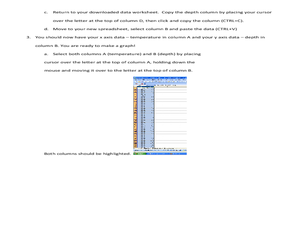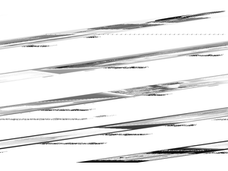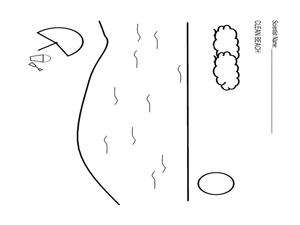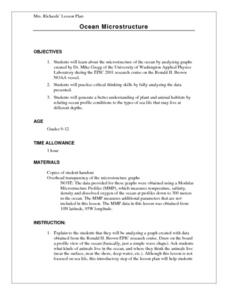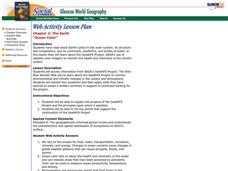Curated OER
The Inside Current
Eighth graders explore ocean currents and wind patterns. They discover the concept of systems to show how change in one component of a body of water, causes change in other components in that system. Students describe positive and...
Curated OER
It Looks Like Champagne
Students determine some practical implications of the discovery of liquid carbon dioxide in deep-ocean ecosystems. They interpret phase diagrams and explain the meaning of "critical point" and "triple point."
Curated OER
Yo-Yos, Tow-Yos and pH, Oh My!
Students explore how hydrothermal vents are formed and where they are located on the ocean floor. They study how scientists use CTDs to locate hydrothermal vents.
Curated OER
Under Pressure: How Deep Can They Dive?
Students explore geography by conducting an in-class experiment. In this deep sea exploration instructional activity, students identify the different zones of the ocean and utilize water bottles, masking tape and scissors to conduct a...
Curated OER
What's A Water Column Profile?
Learners investigate water column data. In this earth science and seawater instructional activity, students determine how temperature, salinity, and density have an impact on sea water by viewing and analyzing data obtained from a number...
Curated OER
Salinity
Students take a provided ocean Trivia Quiz in order to start a discussion of the ocean. They then perform an experiment on how the amount of salt in the ocean affects it and varies from ocean to ocean.
Curated OER
Density and Convection Currents
Students listen as the teacher explains convection currents in the ocean. They experiment with finding a smoking match in the classroom with their eyes closed. Students discuss what might effect their ability to pinpoint the smoke...
Curated OER
Gallery Walk Questions about Energy and Material Cycles
Students state the physical, chemical or biological processes associated with these environments: Pelagic ocean zone, California coat Cave, Indiana Barrier island beach, North Carolina Sand dune, Dunes National Park, Colorado Wetland and...
Curated OER
The Tell-Tale Plume
High schoolers examine hydrothermal vents. In this ocean instructional activity, students identify changes in physical and chemical properties of sea water caused by hydrothermal vents.
Curated OER
Global Warming Statistics
Students research real-time and historic temperature data of U.S. and world locations, and analyze the data using mean, median, and mode averages. They graph the data and draw conclusions by analyzing the data. A spreadsheet is used to...
Curated OER
Oceans-Coral Reefs
Second graders investigate coral reefs. In this oceanology lesson plan, 2nd graders discuss what constitutes a coral reef and the wildlife that lives there. Students watch a video about coral reefs and take an online quiz.
Curated OER
Climate Change Challenge
Students participate in a demonstration in which they role-play polar bears and habitat components to demonstrate the impacts of climate change on the Arctic Ocean ecosystem.
Curated OER
Wacky Weather
In this weather learning exercise, learners read a 3 page story about a girl who notices unusual weather patterns. Included in the story is information about climate, temperature, tides and wind. Students then answer 6 essay questions.
Curated OER
Nature Superfish
Students examine the billfish as a predator in the ocean. In this ocean, creatures, and tides lesson, students view video clips and discuss the sea creatures and scientists in the videos. Students create their own videos. students...
Curated OER
Air Pressure & Barometers
Fourth graders observe, measure, and record data on the basic elements of weather over a period of time (i.e., precipitation, air temperature, wind speed and direction, and air pressure). Then, they make a barometer and keep record of...
Information is Beautiful
How Many Gigatons of Carbon Dioxide...?
Here is an interesting infographic that presents information on the amount of carbon dioxide we can safely release into the atmosphere compared to the actual amount we have released to date.
California Academy of Science
The Heat is On: Cause and Effect and Climate
The higher the number of letters in the final word for the National Spelling Bee, the higher the number of people killed by venomous spiders. Obviously, those two facts correlate, but no causation exists. Scholars view data based on...
Curated OER
Wave Behavior
In this wave behavior worksheet, students will read about how sound waves are formed and how air and water temperature affects sound waves travel. Then students will complete 2 short answer questions based on the information they read.
Curated OER
Is Global Warming Affecting Hurricanes?
In this hurricane worksheet, learners use data charts showing the number of hurricanes and the severity of these hurricanes to determine if global warming is causing an increase in hurricanes. This worksheet has 2 short answer questions.
Curated OER
Sea and Ice Salinity
Students conduct an experiment. In this salinity lesson, students learn about sea ice, why it is important and how changing amounts can affect the sea. Students conduct an experiment to find out the effects of salinity on the formation...
Curated OER
Fish Hazards
Students study the Pacific salmon and see the different challenges they face. In this environment lesson students complete several activities that show how humans have affected the salmon environment. These activities have varying...
Curated OER
Ocean Microstructure
Students assess the ocean's microstructure by analyzing graphs created during tne Ronald H.Brown research cruise. they discuss at what depths various sea animals live and write paragraphs on data analysis from the graphs.
Curated OER
Ocean Color
Students examine NASA's SeaWiFS Project Web site to explore how the SeaWiFS Project monitors environmental and climatic changes in the oceans and atmosphere. They answer questions and write a summary in support of continued funding for...
Curated OER
Water Currents
Students demonstrate how ocean currents are influenced by changes in density. They discover that temperature and salintiy affect density as well. They participate in a short experiment to end the lesson.






